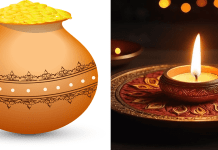Raksha Bandhan, often referred to as Rakhi, is a cherished traditional Hindu festival that holds a special place in the hearts of people across India and the broader Indian subcontinent. This joyous occasion celebrates the unbreakable bond between siblings, particularly brothers and sisters.
The term “Raksha Bandhan” itself carries a powerful message, as it translates to “bond of protection.” This theme of protection, care, and commitment forms the core essence of the festival. On this day, sisters tie intricately designed threads known as “rakhis” around their brothers’ wrists, symbolizing their love, affection, and prayers for their brothers’ well-being. In return, brothers offer gifts and promise to protect and support their sisters throughout their lives.
The mythological stories of Raksha Bandhan
Raksha Bandhan, while primarily a cultural and social celebration, is not deeply rooted in ancient Hindu mythology like some other festivals. Instead, it has evolved over time through various historical and regional influences. However, there are a few mythological stories and references that have been associated with the festival:
The mythological story of Draupadi and Lord Krishna
The mythological story of Draupadi and Lord Krishna beautifully encapsulates the essence of Raksha Bandhan, the festival of protection and sibling bonds. This tale comes from the epic Mahabharata, a treasure trove of ancient Indian narratives.
After the Pandavas successfully performed the Rajsuya Yagya and established their capital, Indraprastha, they hosted a grand gathering of kings and dignitaries. Among the guests was Shishupal, Lord Krishna’s cousin, who held a deep grudge against Krishna. In the court of Yudhishthira, Shishupal hurled insults and abuse at Krishna, crossing all boundaries of decorum and respect. Unable to bear Shishupal’s relentless transgressions, Krishna released his mighty Sudarshana Chakra to punish him.
As the divine disc whirled towards Shishupal, Krishna’s finger got inadvertently cut by its razor-sharp edge. Blood began to flow from Krishna’s finger. In this moment of turmoil, Draupadi, the queen of the Pandavas and an old friend of Krishna, sprang into action. Without hesitation, she tore a piece of her royal clothing and used it to staunch the bleeding of Krishna’s finger.
This act of Draupadi’s deep compassion and swift action left a profound impact on Krishna. He was moved by her selflessness and care, and he vowed to protect her whenever she needed him. This incident forged an unbreakable bond between Krishna and Draupadi, highlighting the importance of standing up for each other and providing support in times of distress. When Draupadi faced the humiliation of Vastra Haran (disrobing) in the Kaurava court, it was Lord Krishna who extended his divine protection and ensured her dignity remained intact.
This story of Krishna and Draupadi underscores the ideals of Raksha Bandhan—sibling love, care, and the promise of protection. It signifies that bonds of friendship and devotion are not confined to biological relationships but extend to those who show kindness and loyalty. Just as Draupadi’s swift response to Krishna’s injury solidified their bond, the festival of Raksha Bandhan celebrates the everlasting ties between siblings and the duty to safeguard and care for each other.
The mythological story of Yama and the Yamuna
In the mythological story of Yama and the Yamuna, Yama, the god of death, and his sister Yamuna, the sacred river, share a bond that transcends their divine roles. It is said that Yamuna tied a rakhi, a sacred thread, around Yama’s wrist, expressing her love and care for him. Touched by her gesture, Yama granted her a boon—anyone who receives a rakhi from their sister and promises protection on this day shall attain immortality. This story underscores the idea of protection and loyalty inherent in Raksha Bandhan. It’s a reminder of the significance of sibling relationships and the duty to safeguard and care for one another.
The mythological story of Goddess Lakshmi and King Mahabali
The mythological story of Goddess Lakshmi and King Mahabali is equally intriguing. Despite being a demon king, Mahabali was known for his piety and devotion to Lord Vishnu. When Vishnu took the form of Vamana and approached Mahabali for a boon, Mahabali’s genuine honesty and selflessness led him to ask for the opportunity to accompany Vishnu to Patala Loka, the netherworld. Vishnu agreed, and in doing so, demonstrated his magnanimity.
Goddess Lakshmi, the consort of Lord Vishnu, noticed his absence from their abode in Vaikuntha and learned of his presence in the netherworld with Mahabali. To bring her beloved Vishnu back, she took on the guise of an aged woman and approached Mahabali. In an act of humility and determination, she sought refuge at his palace and tied a sacred thread around his wrist. She then requested his assistance in finding her “lost husband,” knowing full well that he was the very person she sought.
This story carries layers of symbolism. It highlights Goddess Lakshmi’s deep devotion and her dedication to reclaiming her beloved Vishnu. The act of tying the sacred thread can be seen as a representation of her seeking his protection and the promise of his return. Mahabali’s eventual realization and surrender emphasize the power of divine love and the underlying truths that govern the universe.
These mythological narratives, like many others in Hindu mythology, contain timeless teachings and profound messages that reflect various aspects of human relationships, devotion, and the interconnectedness of the divine and mortal realms. They enrich the cultural and spiritual fabric of the society, offering guidance and inspiration to those who contemplate their meanings.
The Spiritual Significance of Raksha Bandhan
While the festival primarily has a cultural and social aspect, it can also carry spiritual significance based on certain interpretations and practices. Here are a few ways in which Raksha Bandhan can be seen with spiritual meaning:
1. Protection and Blessings: Raksha Bandhan, meaning “bond of protection,” involves sisters tying sacred threads (rakhis) around brothers’ wrists, symbolizing love and prayers for their well-being. This act invokes divine blessings and safeguards.
2. Karmic Connections: Hindu philosophy views sibling bonds as reflections of shared karma from past lives. Raksha Bandhan is a chance to show gratitude, fostering positive karma and spiritual growth.
3. Sacrifice and Selflessness: Tying a rakhi represents a sister’s selfless love. This reflects valued spiritual qualities, aligning with teachings on kindness and compassion.
4. Renewing Relationships: Raksha Bandhan helps mend relationships, encouraging forgiveness and healing. This aligns with spiritual principles of letting go of negativity.
5. Prayer and Intention: Rakhi tying often includes prayers for well-being. These prayers carry deep spiritual energy, acting as positive affirmations.
6. Universal Love and Unity: Raksha Bandhan extends beyond siblings to cousins and friends, reflecting interconnectedness. It emphasizes universal love and compassion.
7. Symbolism of Rakhi: The rakhi symbolizes the bond between individual soul (atman) and universal soul (Brahman) in Hindu philosophy. Tying it signifies the connection to the divine and unity in relationships.
It’s important to note that the spiritual significance of Raksha Bandhan may vary based on individual beliefs and interpretations. While the festival’s primary focus is on sibling relationships, the rituals and sentiments associated with it can certainly be viewed through a spiritual lens, promoting love, unity, and positive intentions.



























































